Fourth Balkenende cabinet
| Fourth Balkenende cabinet | |
|---|---|
|
67th cabinet of the Netherlands | |
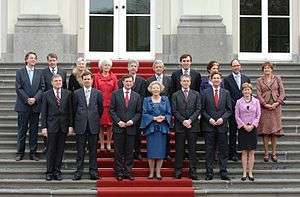 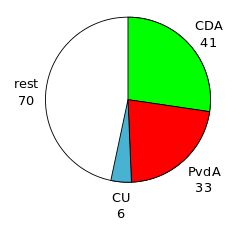 The installation of the Fourth Balkenende cabinet on 22 February 2007 | |
| Date formed | 22 February 2007 |
| Date dissolved |
14 October 2010 (Demissionary from 20 February 2010) |
| People and organisations | |
| Monarch | Queen Beatrix |
| Prime Minister | Jan Peter Balkenende |
| Deputy Prime Minister |
Wouter Bos André Rouvoet |
| No. of ministers | 16 |
| Ministers removed (Death/resignation/dismissal) | 7 |
| Total no. of ministers | 19 |
| Member party |
Christian Democratic Appeal (CDA) Labour Party (PvdA) Christian Union (CU) |
| Status in legislature | Grand coalition |
| Opposition party | Socialist Party |
| Opposition leader | Jan Marijnissen |
| History | |
| Election(s) | 2006 election |
| Outgoing election | 2010 election |
| Legislature term(s) | 2006–2010 |
| Incoming formation | 2006–2007 formation |
| Outgoing formation | 2010 formation |
| Predecessor | Third Balkenende cabinet |
| Successor | First Rutte cabinet |
![Azure, billetty Or a lion with a coronet Or armed and langued Gules holding in his dexter paw a sword Argent hilted Or and in the sinister paw seven arrows Argent pointed and bound together Or. [The seven arrows stand for the seven provinces of the Union of Utrecht.] The shield is crowned with the (Dutch) royal crown and supported by two lions Or armed and langued gules. They stand on a scroll Azure with the text (Or) "Je Maintiendrai" (French for "I will maintain".)](../I/m/State_coat_of_arms_of_the_Netherlands.svg.png) |
|---|
| This article is part of a series on the politics and government of the Netherlands |
|
Local government |
|
The Fourth Balkenende cabinet was the cabinet of the Netherlands from 22 February 2007 until 14 October 2010. The cabinet was formed by the political parties Christian Democratic Appeal (CDA), Labour Party (PvdA) and the Christian Union (CU) after the election of 2006. The grand coalition cabinet was a majority government in the House of Representatives.
Formation
Following the fall of the Second Balkenende cabinet on 30 June 2006 the Democrats 66 (D66) left the coalition and the Christian Democratic Appeal and the People's Party for Freedom and Democracy (VVD) formed a rump cabinet. The Third Balkenende cabinet was installed on 7 July 2006 and served as a caretaker government until the election of 2006 on 22 November 2006. After the election the Christian Democratic Appeal (CDA) of incumbent Prime Minister Jan Peter Balkenende was the winner of the election but lost 3 seats and had now a total of 41 seats. The Labour Party (PvdA) of Wouter Bos lost 9 seats and had now 33 seats. The Socialist Party (SP) of Jan Marijnissen was the biggest winner with 16 new seats and had now 25 seats. Two new parties won representation in the House of Representatives, the recently founded Party for Freedom (PVV) of Geert Wilders, a former Member of the House of Representatives for the People's Party for Freedom and Democracy won nine seats and the Party for the Animals (PvdD) of Marianne Thieme, a noted animal rights activist won two seats, the first time an animal advocacy party won representation in a national legislative body.
On 25 November 2006 Queen Beatrix appointed Member of the Council of State Rein Jan Hoekstra (CDA) as Informateur. Hoekstra explored the possibilities for the different three party coalitions, since no two parties could form a majority in the House of Representatives together. This resulted in a coalition agreement between the Christian Democratic Appeal (CDA), Labour Party (PvdA) and the Christian Union (CU), together these three parties had 79 seats out of 150 seats in the House of Representatives.[1]
On 20 December 2006 Queen Beatrix appointed former Chairman of the Social-Economic Council Herman Wijffels (CDA) as Informateur to start the second information round and negotiate a coalition agreement between the Leader of the Christian Democratic Appeal Jan Peter Balkenende, the Leader of the Labour Party Wouter Bos and the Leader of the Christian Union André Rouvoet. On 7 February 2007 a coalition was reached with the motto of the agreement: "Samen leven, samen werken" ("Living together, working together"). On 9 February 2007 Queen Beatrix appointed incumbent Prime Minister Jan Peter Balkenende (CDA) as Formateur to start the last phase of the formation.[2] On 22 February the cabinet members were sworn in by Queen Beatrix.
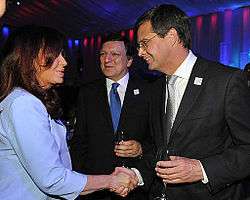
Term
Policy
The coalition agreement titled "Living together, working together" was presented on 7 February in a press conference by Balkenende, Bos, Rouvoet. It is structured into six commitments of the new cabinet. If a proposal was included in a party's electoral manifesto, this is mentioned as well.[3][4]
- An active and constructive role in the world, which is characterized by these policies:
- Continued investments into the Joint Strike Fighter (as the CDA proposed).
- The new cabinet is not in favour of a new referendum on the European Constitution, which was voted down in 2005, but will consider new initiatives (both the CDA and CU opposed the referendum initially).
- An innovative, competitive and entrepreneurial economy, which is characterized by these policies:
- 1 billion increased spending on education (as all parties proposed).
- Privatization of Schiphol airport is shelved (as the CU and the PvdA proposed).
- A durable environment, which is characterized by these policies:
- 800 million euros additional spending on renewable energy (as both the PvdA and the CU proposed).
- Pollution will be taxed more heavily (as both the PvdA and the CU proposed).
- A tax on airline tickets totalling 350 million euros (as all parties proposed).
- No new investments in nuclear energy (as the CU and the PvdA proposed).
- Social cohesion, which is characterized by these policies:
- A reform of the system of basic state pensions: people who have private pensions of 15,000 euros and higher and who stop working before the age of 65 will pay an additional tax as of 2011. People who work beyond 65 receive tax breaks. This measure should guarantee an affordable basic state pension (AOW) despite trends in population ageing (a compromise between the PvdA, which wanted to tax all rich elderly and the CDA which wanted incentives to make people work longer).
- Public social housing will not be liberalised, rent rates may be raised only in line with inflation (as the PvdA proposed).
- The tax deduction on mortgage interest payments remains unchanged (as the CDA proposed).
- Investments in problem areas in the large cities to make them "beautiful neighbourhoods" (as the PvdA proposed).
- Re-implementation of the subsidized jobs-scheme for the unemployed (as the PvdA proposed).
- Childcare spending totalling 700 million euros (free child care was a PvdA election promise and opposed by CDA).
- Safety, stability and respect, which is characterized by these policies:
- Government and a servile public sector[5]
- In response to opposition to extravagant wages earned by some top civil servants and top level managers of quangos, sometimes five times that of the prime minister, no one will be allowed an income greater than the prime minister's. In order to accomplish this, the prime minister's salary will be increased.
- Cutting the number of civil servants to save 750 million euros.
- Women seeking an abortion are to expect an additional waiting period between first consultation and actual procedure on top of the already mandatory five days waiting period (as the CU proposed).
- Minor reforms of the health care-system, including the abolishment of the no claim and the re-inclusion of dental care into the basic insurance.
- Increased taxation on cigarettes and liquor, smoke-free bars and restaurants by 2011.
- A general pardon for asylum seekers who entered the Netherlands before the new Asylum Law came into effect (as both the CU and the PvdA proposed).
- The coalition wants to have a budget surplus of 1% of the GDP by 2011 with a projected 2% annual economic growth (as all parties proposed).
Fall and aftermath
In February 2010, NATO had officially requested the Netherlands to extend its military involvement in Task Force Uruzgan, the ISAF operation in the Afghan province of Uruzgan, aimed at training Afghan security forces and transfer of responsibilities to the local authorities.[6][7][8] Coalition party PvdA strongly opposed the extension of the mission.[9][10][11] The collision between the government and the parliament, of which the majority disagreed with an extension of the mission, as well as between the coalition partners in the cabinet, threatened the existence of the cabinet[12] and led to its fall in the night between 19 and 20 February 2010, after 16 hours of deliberations between the cabinet members. The Labour members resigned from the cabinet.[13][14][15][16]
As queen Beatrix was on holiday in Austria (Lech am Arlberg) at the time, Balkenende informed her formally by phone about the break-up of the cabinet. She returned soon to The Hague and held consultations with advisors and with the leaders of all political groupings in parliament on 22 and 23 February. On the latter day, the queen accepted the resignations of the PvdA ministers and secretaries, and maintained the 15 remaining cabinet members of CDA and Christian Union (whose positions had also been offered to the queen for consideration, a customary procedure in the Netherlands) to run a demissionary cabinet (caretaker government), which meant that it could not make large decisions or proposals on topics deemed controversial. No new cabinet members were appointed, the already functioning ministers and state secretaries taking care of the empty positions until a new government would be formed. Early elections were held on 9 June 2010. The cabinet formation started a day later.
Labour leader Wouter Bos, who resigned as deputy prime minister and finance minister, announced that he wanted to continue to lead his party. Labour Party leader Bos denied that the upcoming local elections in the Netherlands played a role in the decision to refuse to compromise on a possible extension of the Dutch military mission in Afghanistan.[17]
Cabinet Members
| Ministers | Title/Ministry | Term of office | Party | |||
|---|---|---|---|---|---|---|
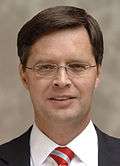 |
Dr. Jan Peter Balkenende (born 1956) |
Prime Minister | General Affairs | 22 July 2002 – 14 October 2010 [Retained] |
Christian Democratic Appeal | |
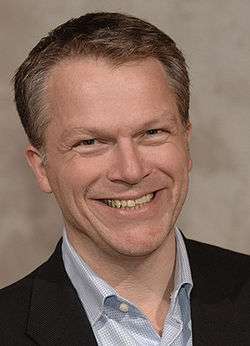 |
Wouter Bos (born 1963) |
Deputy Prime Minister / Minister |
Finance | 22 February 2007 – 23 February 2010 [Res] |
Labour Party | |
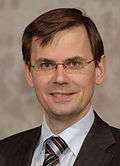 |
André Rouvoet (born 1962) |
Deputy Prime Minister / Minister |
Youth Policy and Family Policy (within Health, Welfare and Sport) |
22 February 2007 – 14 October 2010 |
Christian Union | |
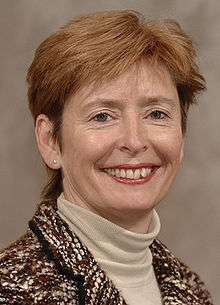 |
Dr. Guusje ter Horst (born 1952) |
Minister | Interior and Kingdom Relations |
22 February 2007 – 23 February 2010 [Res] |
Labour Party | |
 |
Dr. Ernst Hirsch Ballin (born 1950) |
23 February 2010 – 14 October 2010 |
Christian Democratic Appeal | |||
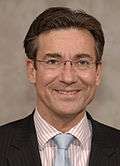 |
Maxime Verhagen (born 1956) |
Minister | Foreign Affairs | 22 February 2007 – 14 October 2010 |
Christian Democratic Appeal | |
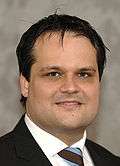 |
Jan Kees de Jager (born 1969) |
Minister | Finance | 23 February 2010 – 5 November 2012 |
Christian Democratic Appeal | |
 |
Dr. Ernst Hirsch Ballin (born 1950) |
Minister | Justice | 22 September 2006 – 14 October 2010 [Retained] |
Christian Democratic Appeal | |
 |
Maria van der Hoeven (born 1949) |
Minister | Economic Affairs | 22 February 2007 – 14 October 2010 |
Christian Democratic Appeal | |
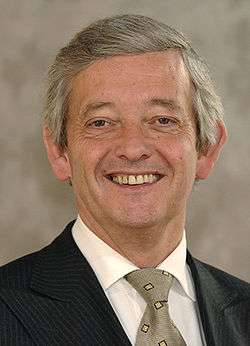 |
Eimert van Middelkoop (born 1949) |
Minister | Defence | 22 February 2007 – 14 October 2010 |
Christian Union | |
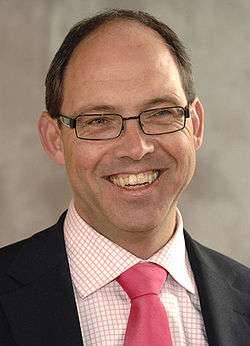 |
Dr. Ab Klink (born 1958) |
Minister | Health, Welfare and Sport |
22 February 2007 – 14 October 2010 |
Christian Democratic Appeal | |
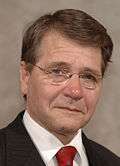 |
Piet Hein Donner (born 1948) |
Minister | Social Affairs and Employment |
22 February 2007 – 14 October 2010 |
Christian Democratic Appeal | |
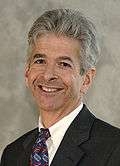 |
Dr. Ronald Plasterk (born 1957) |
Minister | Education, Culture and Science |
22 February 2007 – 23 February 2010 [Res] |
Labour Party | |
 |
André Rouvoet (born 1962) |
23 February 2010 14 October 2010 |
Christian Union | |||
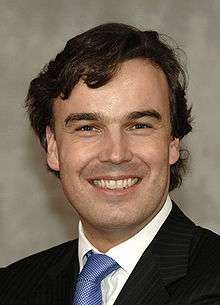 |
Camiel Eurlings (born 1973) |
Minister | Transport and Water Management |
22 February 2007 – 14 October 2010 |
Christian Democratic Appeal | |
 |
Gerda Verburg (born 1957) |
Minister | Agriculture, Nature and Food Quality |
22 February 2007 – 14 October 2010 |
Christian Democratic Appeal | |
 |
Dr. Jacqueline Cramer (born 1951) |
Minister | Housing, Spatial Planning and the Environment |
22 February 2007 – 23 February 2010 [Res] |
Labour Party | |
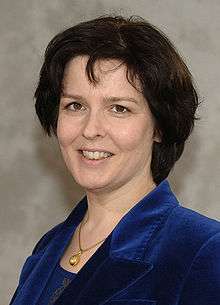 |
Tineke Huizinga (born 1960) |
23 February 2010 – 14 October 2010 |
Christian Union | |||
| Ministers without portfolio | Title/Portfolio/Ministry | Term of office | Party | |||
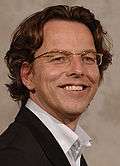 |
Bert Koenders (born 1958) |
Minister | Development Cooperation (within Foreign Affairs) |
22 February 2007 – 23 February 2010 [Res] |
Labour Party | |
 |
Maxime Verhagen (born 1956) |
23 February 2010 – 14 October 2010 |
Christian Democratic Appeal | |||
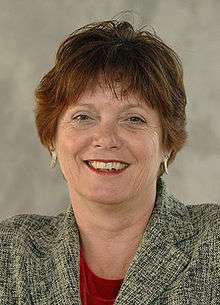 |
Ella Vogelaar (born 1949) |
Minister | Housing, Communities and Integration (within Housing, Spatial Planning and the Environment) |
22 February 2007 – 14 November 2008 [Res] |
Labour Party | |
.jpg) |
Eberhard van der Laan (1955–2017) |
14 November 2008 – 23 February 2010 [Res] |
Labour Party | |||
 |
Eimert van Middelkoop (born 1949) |
23 February 2010 – 14 October 2010 |
Christian Union | |||
| State Secretaries | Title/Portfolio/Ministry | Term of office | Party | |||
 |
Ank Bijleveld (born 1962) |
State Secretary | • Central Government Affairs • Provincial Government Affairs • Local Government Affairs • Government Reform • Government Real Estate • Kingdom Relations • Emergency Services • Disaster Management (within Interior and Kingdom Relations) |
22 February 2007 – 14 October 2010 |
Christian Democratic Appeal | |
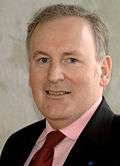 |
Frans Timmermans (born 1961) |
State Secretary [Title] |
• European Affairs • NATO Affairs • Benelux Affairs (within Foreign Affairs) |
22 February 2007 – 23 February 2010 [Res] |
Labour Party | |
 |
Jan Kees de Jager (born 1969) |
State Secretary | • Fiscal Affairs • Tax and Customs Administration • Local Government Finances • National Mint • State Lottery (within Finance) |
22 February 2007 – 23 February 2010 [Appt] |
Christian Democratic Appeal | |
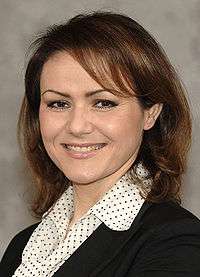 |
Nebahat Albayrak (born 1968) |
State Secretary | • Immigration • Asylum Affairs • Prison Administration • Rehabilitation • Prevention (within Justice) |
22 February 2007 – 23 February 2010 [Res] |
Labour Party | |
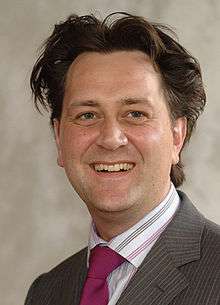 |
Frank Heemskerk (born 1969) |
State Secretary [Title] |
• International Trade • Export Promotion • Regional Development • Consumer Protection • Digital Infrastructure • Postal Service • Tourism Affairs (within Economic Affairs) |
22 February 2007 – 23 February 2010 [Res] |
Labour Party | |
 |
Cees van der Knaap (born 1951) |
State Secretary | • Personnel Affairs • Equipment Policy (within Defence) |
22 July 2002 – 18 December 2007 [Retained] [Appt] |
Christian Democratic Appeal | |
.jpg) |
Jack de Vries (born 1968) |
18 December 2007 – 18 May 2010 [Res] |
Christian Democratic Appeal | |||
 |
Dr. Jet Bussemaker (born 1961) |
State Secretary | • Elderly Policy • Disability Affairs • Veteran Affairs • Biotechnology Policy • Medical Ethics Policy • Sport (within Health, Welfare and Sport) |
22 February 2007 – 23 February 2010 [Res] |
Labour Party | |
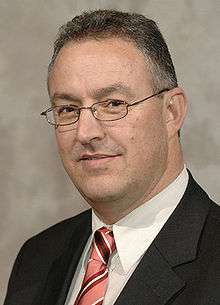 |
Ahmed Aboutaleb (born 1961) |
State Secretary | • Social Security • Unemployment Affairs • Occupational Safety • Social Services • Poverty Policy (within Social Affairs and Employment) |
22 February 2007 – 18 December 2008 [Appt] |
Labour Party | |
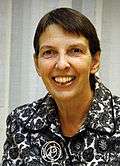 |
Jetta Klijnsma (born 1957) |
18 December 2008 – 23 February 2010 [Res] |
Labour Party | |||
 |
Marja van Bijsterveldt (born 1961) |
State Secretary | • Secondary Education • Adult Education • Teacher Policy (within Education, Culture and Science) |
22 February 2007 – 23 February 2010 |
Christian Democratic Appeal | |
| • Primary Education • Secondary Education • Higher Education • Special Education • Adult Education • Science Policy • Early Childhood Education • Teacher Policy • Equality • Emancipation • Media Affairs • Culture Policy • Arts Policy (within Education, Culture and Science) |
23 February 2010 – 14 October 2010 | |||||
 |
Sharon Dijksma (born 1971) |
• Primary Education • Special Education • Early Childhood Education (within Education, Culture and Science) |
22 February 2007 – 23 February 2010 [Res] |
Labour Party | ||
 |
Tineke Huizinga (born 1960) |
State Secretary | • Transport Infrastructure • Water Infrastructure • Public Transport • Weather Forecasting Service (within Transport and Water Management) |
22 February 2007 – 23 February 2010 [Appt] |
Christian Union | |
| Source: (in Dutch) Kabinet-Balkenende IV Rijksoverheid | ||||||
- Retained Retained this position from the previous cabinet.
- Res Resigned.
- Title Allowed to use the title of Minister while on foreign business.
- Appt Appointment: Jan Kees de Jager appointed Minister of Finance; Cees van der Knaap appointed Mayor of Ede; Tineke Huizinga appointed Minister of Housing, Spatial Planning and the Environment; Ahmed Aboutaleb appointed Mayor of Rotterdam.
Trivia
- Seven cabinet members; Jan Peter Balkenende, Guusje ter Horst, Ernst Hirsch Ballin, Ab Klink, Ronald Plasterk, Jacqueline Cramer and Jet Bussemaker had a doctoral degree.
- Four cabinet members of the CDA; Maxime Verhagen, Jan Kees de Jager, Piet Hein Donner and Marja van Bijsterveldt continued to serve in the new cabinet.
- Six cabinet members of the PvdA; Ronald Plasterk, Bert Koenders, Frans Timmermans, Jet Bussemaker, Jetta Klijnsma and Sharon Dijksma and later served in the Second Rutte cabinet.
References
- ↑ (in English) "Balkenende clings to power as Dutch head for uneasy coalition". The Independent. 23 November 2006. Retrieved 7 May 2018.
- ↑ (in Dutch) "Balkenende benoemd tot formateur". NOS. 11 February 2007. Retrieved 7 May 2018.
- ↑ (in Dutch) "Coalitieakkoord tussen de Tweede Kamerfracties van CDA, PvdA en ChristenUnie" (PDF). NOS. 7 February 2007. Retrieved 7 May 2018.
- ↑ (in Dutch) "Hoofdpunten regeerakkoord". NOS. 7 February 2007. Retrieved 7 May 2018.
- ↑ Overheid en dienstbare publieke sector
- ↑ (in Dutch)"NAVO verzoekt nieuwe missie Afghanistan"
- ↑ "NATO would like Dutch to train Afghan troops"
- ↑ (in Dutch)"Kabinet onderzoekt langere missie Afghanistan"
- ↑ "Nato troop request sparks political row"
- ↑ (in Dutch)"Conflict naar climax: nog deze week Uruzgan-besluit"
- ↑ "Labour says final 'no' to Afghanistan"
- ↑ "Will the Dutch government fall over troop deployment?"
- ↑ (in Dutch)"Verklaring Balkenende na afloop ministerraad"
- ↑ (in Dutch)"Kabinet-Balkenende IV gevallen"
- ↑ "Dutch government falls over Afghanistan mission"
- ↑ "Dutch Government Collapses Over Afghan Mission"
- ↑ "Bos denies decision influenced by March poll"
External links
- Official
- (in Dutch) Kabinet-Balkenende IV Parlement & Politiek
- (in Dutch) Kabinet-Balkenende IV Rijksoverheid
| Wikimedia Commons has media related to Cabinet Balkenende IV. |